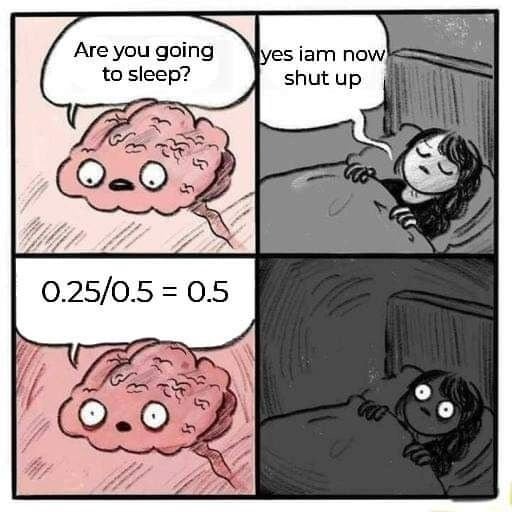this post was submitted on 03 Mar 2024
348 points (86.6% liked)
memes
10428 readers
3343 users here now
Community rules
1. Be civil
No trolling, bigotry or other insulting / annoying behaviour
2. No politics
This is non-politics community. For political memes please go to !politicalmemes@lemmy.world
3. No recent reposts
Check for reposts when posting a meme, you can only repost after 1 month
4. No bots
No bots without the express approval of the mods or the admins
5. No Spam/Ads
No advertisements or spam. This is an instance rule and the only way to live.
Sister communities
- !tenforward@lemmy.world : Star Trek memes, chat and shitposts
- !lemmyshitpost@lemmy.world : Lemmy Shitposts, anything and everything goes.
- !linuxmemes@lemmy.world : Linux themed memes
- !comicstrips@lemmy.world : for those who love comic stories.
founded 1 year ago
MODERATORS
you are viewing a single comment's thread
view the rest of the comments
view the rest of the comments

X/0.5 = X*2
Division by less than 1 is essentially multiplying with extra steps
Huh, thanks for the insight. I've never been able to get my head around weird division like this, and that sounds like a great rule of thumb for thinking about it.
Dividing by a fraction is the same as flipping one it on its head and multiplying it.
0.25/0.5 is (1/4)/(1/2)
To multiply it we'd flip one, either works but for this example I decided to flip the second one: (1/4) * (2/1)
The top half of the fractions (numerators) multiply together, then the bottoms (denominators) multiply together. (1*2)/(4*1) = 2/4 which reduces to 1/2
I learned this one weird trick (maffemetishuns hate him!!!) a few years back when I went back to education and honestly it revolutionised how I looked at fraction division.